How Community Marketing Builds Reputation: Australian Education Focus
VerifiedAdded on 2023/06/12
|6
|986
|74
Report
AI Summary
This report investigates the role of community marketing in building the reputation of educational providers in Australia. It identifies key references and justifies the use of a qualitative research method with an inductive approach and interpretivism philosophy. The research aims to assist Australian educational providers in enhancing their reputation through community marketing and engagement strategies, addressing the challenges they face in student engagement and leadership skill development. Data collection involves both primary (surveys) and secondary sources (books, journals), with thematic analysis used for data interpretation. Ethical considerations, research limitations, and a list of references are also included, providing a comprehensive overview of the research approach and findings.
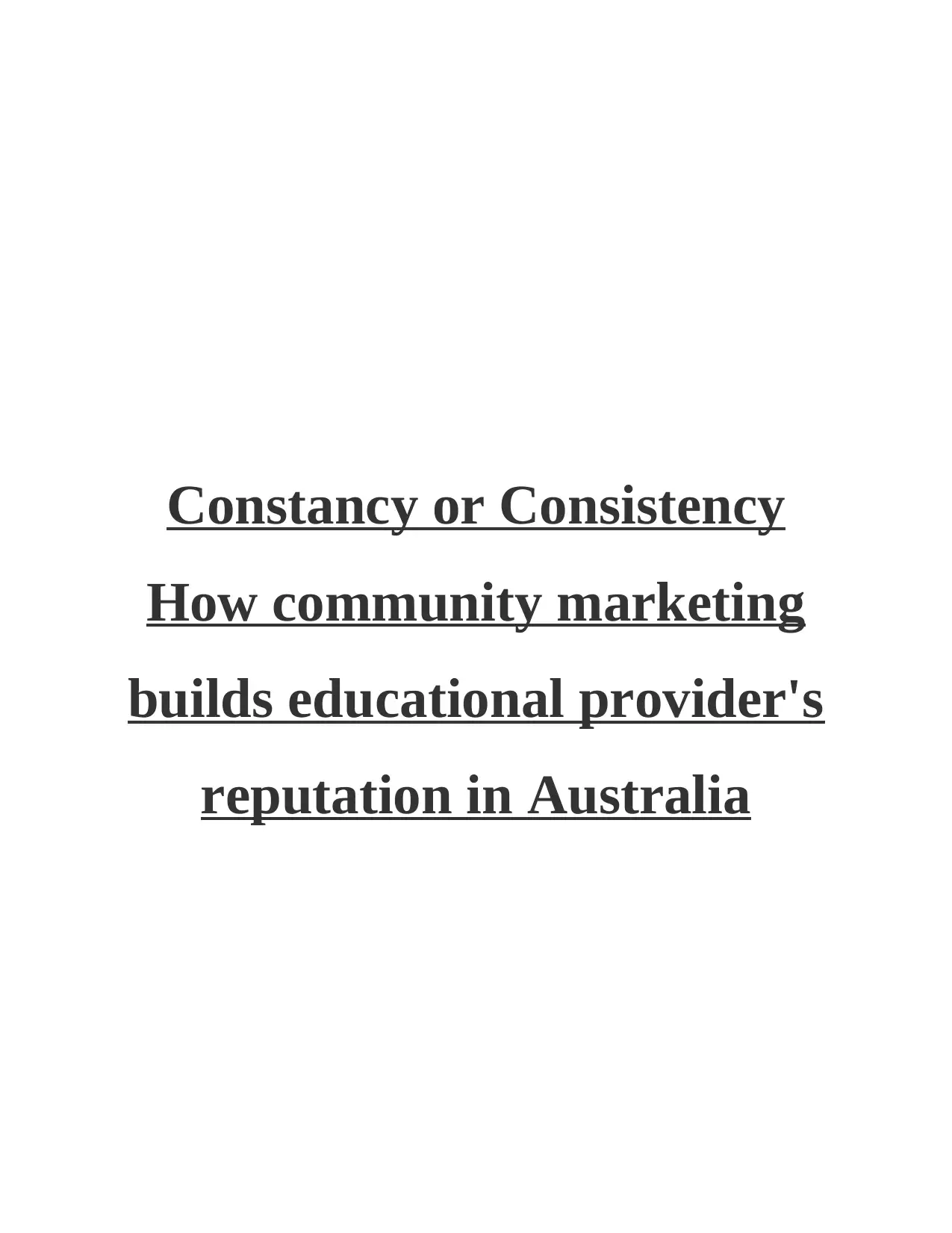
Constancy or Consistency
How community marketing
builds educational provider's
reputation in Australia
How community marketing
builds educational provider's
reputation in Australia
Paraphrase This Document
Need a fresh take? Get an instant paraphrase of this document with our AI Paraphraser
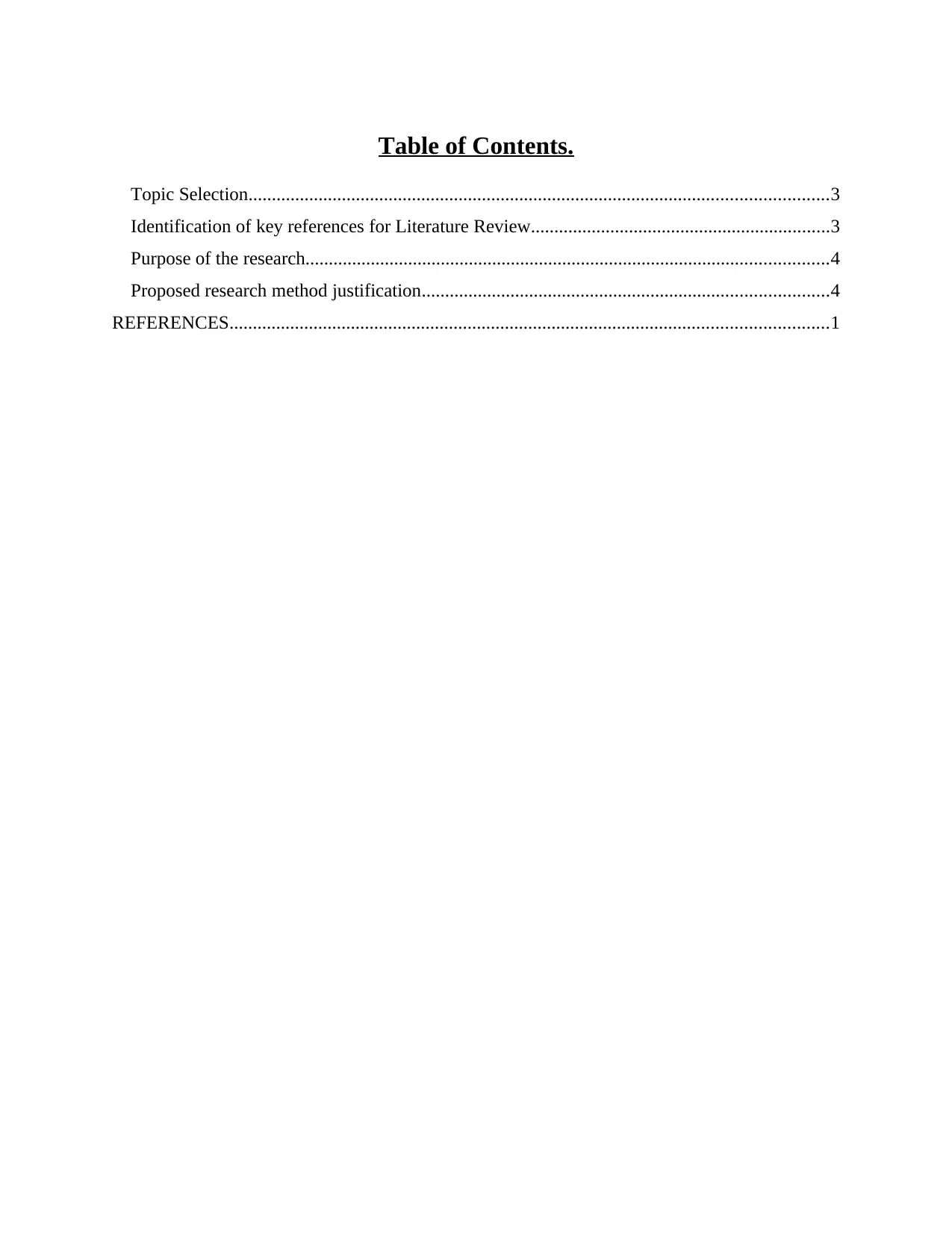
Table of Contents.
Topic Selection............................................................................................................................3
Identification of key references for Literature Review................................................................3
Purpose of the research................................................................................................................4
Proposed research method justification.......................................................................................4
REFERENCES................................................................................................................................1
Topic Selection............................................................................................................................3
Identification of key references for Literature Review................................................................3
Purpose of the research................................................................................................................4
Proposed research method justification.......................................................................................4
REFERENCES................................................................................................................................1
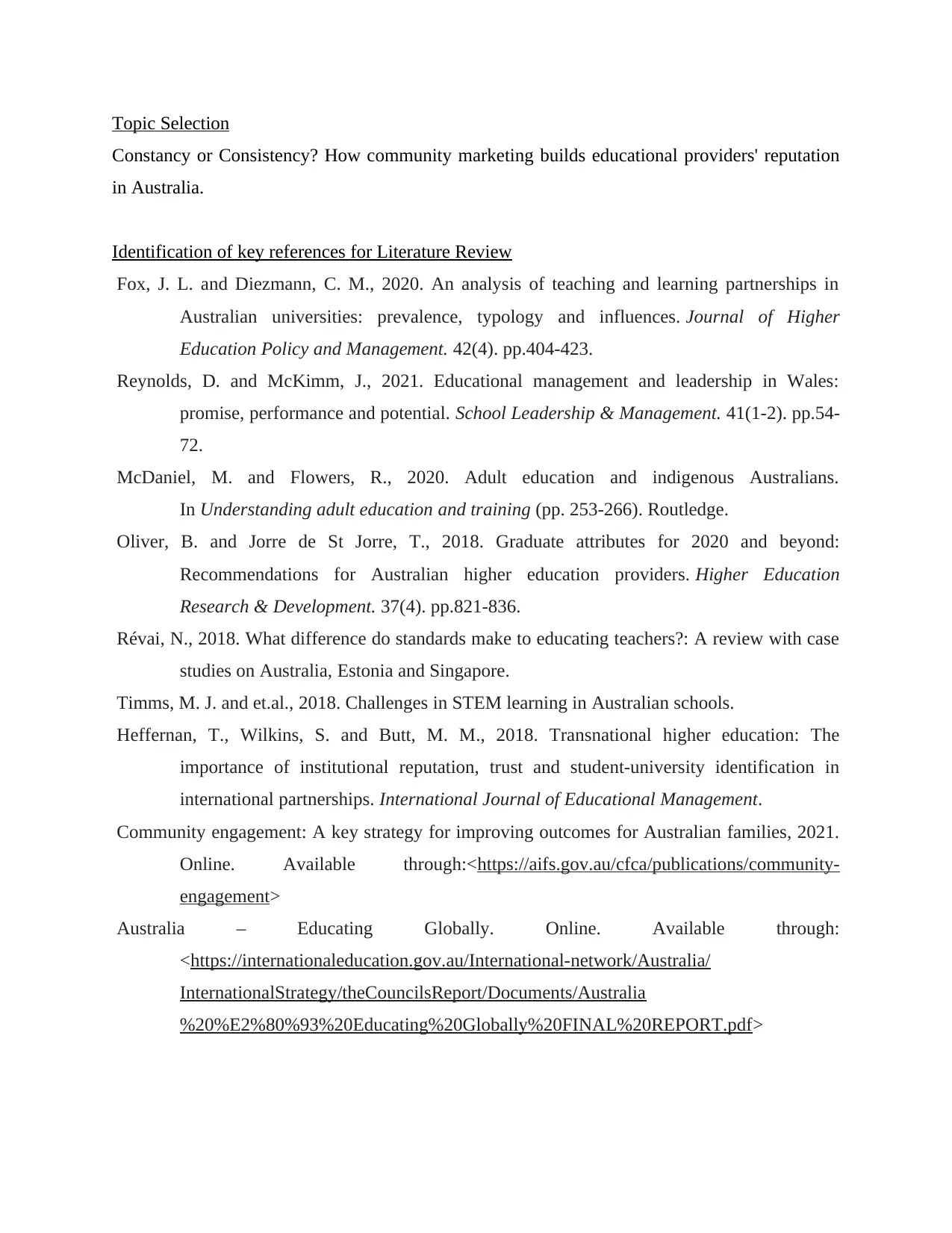
Topic Selection
Constancy or Consistency? How community marketing builds educational providers' reputation
in Australia.
Identification of key references for Literature Review
Fox, J. L. and Diezmann, C. M., 2020. An analysis of teaching and learning partnerships in
Australian universities: prevalence, typology and influences. Journal of Higher
Education Policy and Management. 42(4). pp.404-423.
Reynolds, D. and McKimm, J., 2021. Educational management and leadership in Wales:
promise, performance and potential. School Leadership & Management. 41(1-2). pp.54-
72.
McDaniel, M. and Flowers, R., 2020. Adult education and indigenous Australians.
In Understanding adult education and training (pp. 253-266). Routledge.
Oliver, B. and Jorre de St Jorre, T., 2018. Graduate attributes for 2020 and beyond:
Recommendations for Australian higher education providers. Higher Education
Research & Development. 37(4). pp.821-836.
Révai, N., 2018. What difference do standards make to educating teachers?: A review with case
studies on Australia, Estonia and Singapore.
Timms, M. J. and et.al., 2018. Challenges in STEM learning in Australian schools.
Heffernan, T., Wilkins, S. and Butt, M. M., 2018. Transnational higher education: The
importance of institutional reputation, trust and student-university identification in
international partnerships. International Journal of Educational Management.
Community engagement: A key strategy for improving outcomes for Australian families, 2021.
Online. Available through:<https://aifs.gov.au/cfca/publications/community-
engagement>
Australia – Educating Globally. Online. Available through:
<https://internationaleducation.gov.au/International-network/Australia/
InternationalStrategy/theCouncilsReport/Documents/Australia
%20%E2%80%93%20Educating%20Globally%20FINAL%20REPORT.pdf>
Constancy or Consistency? How community marketing builds educational providers' reputation
in Australia.
Identification of key references for Literature Review
Fox, J. L. and Diezmann, C. M., 2020. An analysis of teaching and learning partnerships in
Australian universities: prevalence, typology and influences. Journal of Higher
Education Policy and Management. 42(4). pp.404-423.
Reynolds, D. and McKimm, J., 2021. Educational management and leadership in Wales:
promise, performance and potential. School Leadership & Management. 41(1-2). pp.54-
72.
McDaniel, M. and Flowers, R., 2020. Adult education and indigenous Australians.
In Understanding adult education and training (pp. 253-266). Routledge.
Oliver, B. and Jorre de St Jorre, T., 2018. Graduate attributes for 2020 and beyond:
Recommendations for Australian higher education providers. Higher Education
Research & Development. 37(4). pp.821-836.
Révai, N., 2018. What difference do standards make to educating teachers?: A review with case
studies on Australia, Estonia and Singapore.
Timms, M. J. and et.al., 2018. Challenges in STEM learning in Australian schools.
Heffernan, T., Wilkins, S. and Butt, M. M., 2018. Transnational higher education: The
importance of institutional reputation, trust and student-university identification in
international partnerships. International Journal of Educational Management.
Community engagement: A key strategy for improving outcomes for Australian families, 2021.
Online. Available through:<https://aifs.gov.au/cfca/publications/community-
engagement>
Australia – Educating Globally. Online. Available through:
<https://internationaleducation.gov.au/International-network/Australia/
InternationalStrategy/theCouncilsReport/Documents/Australia
%20%E2%80%93%20Educating%20Globally%20FINAL%20REPORT.pdf>
⊘ This is a preview!⊘
Do you want full access?
Subscribe today to unlock all pages.

Trusted by 1+ million students worldwide
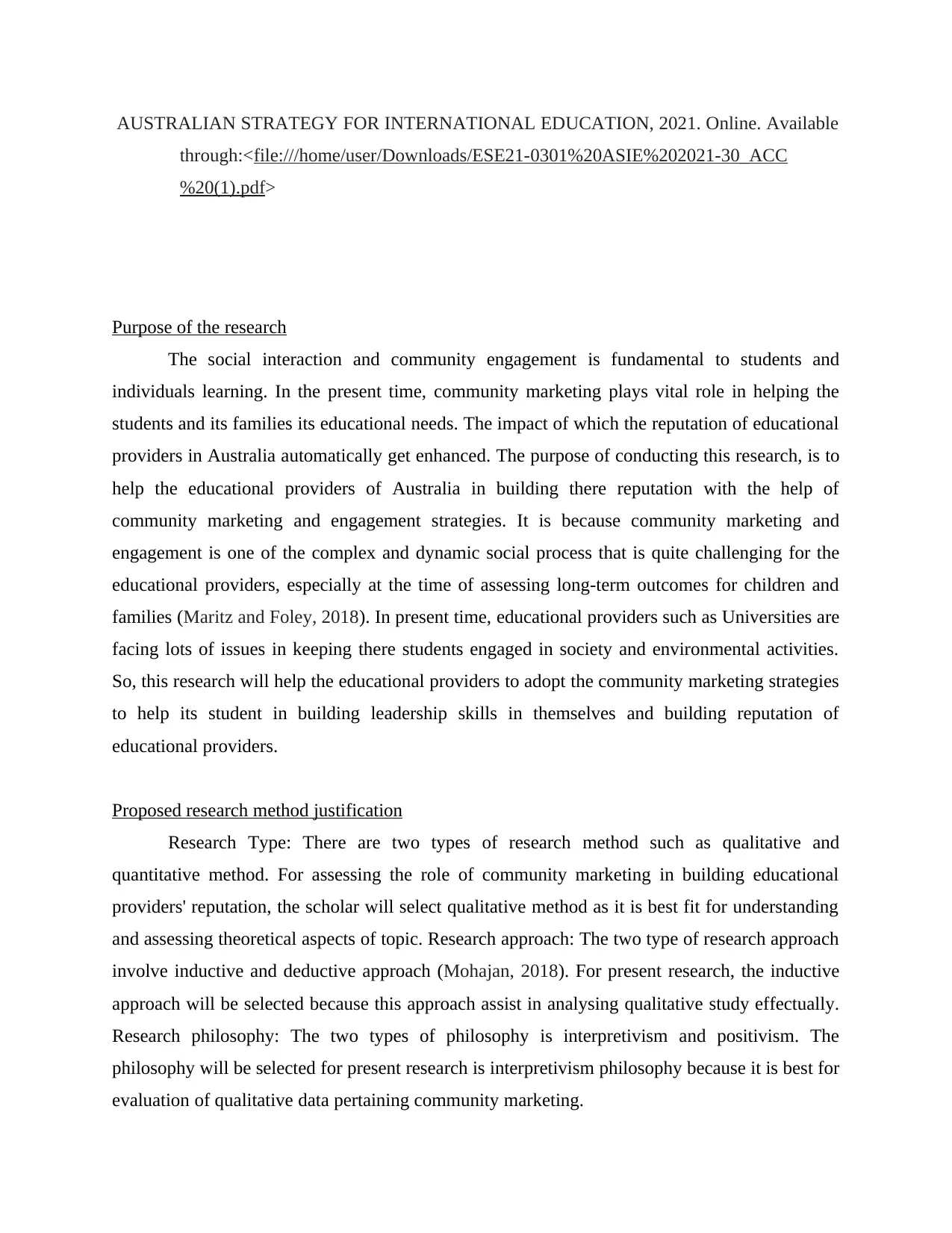
AUSTRALIAN STRATEGY FOR INTERNATIONAL EDUCATION, 2021. Online. Available
through:<file:///home/user/Downloads/ESE21-0301%20ASIE%202021-30_ACC
%20(1).pdf>
Purpose of the research
The social interaction and community engagement is fundamental to students and
individuals learning. In the present time, community marketing plays vital role in helping the
students and its families its educational needs. The impact of which the reputation of educational
providers in Australia automatically get enhanced. The purpose of conducting this research, is to
help the educational providers of Australia in building there reputation with the help of
community marketing and engagement strategies. It is because community marketing and
engagement is one of the complex and dynamic social process that is quite challenging for the
educational providers, especially at the time of assessing long-term outcomes for children and
families (Maritz and Foley, 2018). In present time, educational providers such as Universities are
facing lots of issues in keeping there students engaged in society and environmental activities.
So, this research will help the educational providers to adopt the community marketing strategies
to help its student in building leadership skills in themselves and building reputation of
educational providers.
Proposed research method justification
Research Type: There are two types of research method such as qualitative and
quantitative method. For assessing the role of community marketing in building educational
providers' reputation, the scholar will select qualitative method as it is best fit for understanding
and assessing theoretical aspects of topic. Research approach: The two type of research approach
involve inductive and deductive approach (Mohajan, 2018). For present research, the inductive
approach will be selected because this approach assist in analysing qualitative study effectually.
Research philosophy: The two types of philosophy is interpretivism and positivism. The
philosophy will be selected for present research is interpretivism philosophy because it is best for
evaluation of qualitative data pertaining community marketing.
through:<file:///home/user/Downloads/ESE21-0301%20ASIE%202021-30_ACC
%20(1).pdf>
Purpose of the research
The social interaction and community engagement is fundamental to students and
individuals learning. In the present time, community marketing plays vital role in helping the
students and its families its educational needs. The impact of which the reputation of educational
providers in Australia automatically get enhanced. The purpose of conducting this research, is to
help the educational providers of Australia in building there reputation with the help of
community marketing and engagement strategies. It is because community marketing and
engagement is one of the complex and dynamic social process that is quite challenging for the
educational providers, especially at the time of assessing long-term outcomes for children and
families (Maritz and Foley, 2018). In present time, educational providers such as Universities are
facing lots of issues in keeping there students engaged in society and environmental activities.
So, this research will help the educational providers to adopt the community marketing strategies
to help its student in building leadership skills in themselves and building reputation of
educational providers.
Proposed research method justification
Research Type: There are two types of research method such as qualitative and
quantitative method. For assessing the role of community marketing in building educational
providers' reputation, the scholar will select qualitative method as it is best fit for understanding
and assessing theoretical aspects of topic. Research approach: The two type of research approach
involve inductive and deductive approach (Mohajan, 2018). For present research, the inductive
approach will be selected because this approach assist in analysing qualitative study effectually.
Research philosophy: The two types of philosophy is interpretivism and positivism. The
philosophy will be selected for present research is interpretivism philosophy because it is best for
evaluation of qualitative data pertaining community marketing.
Paraphrase This Document
Need a fresh take? Get an instant paraphrase of this document with our AI Paraphraser
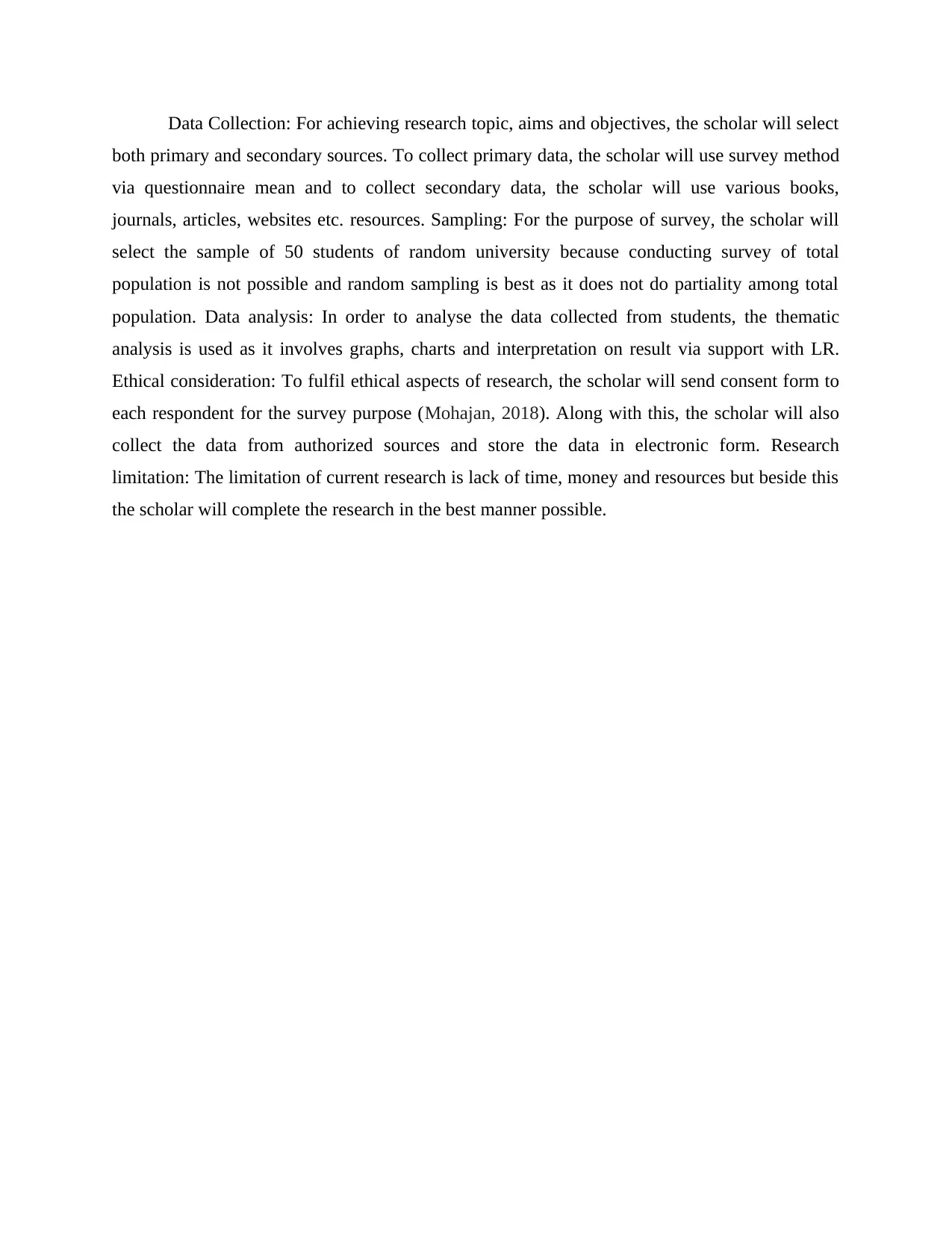
Data Collection: For achieving research topic, aims and objectives, the scholar will select
both primary and secondary sources. To collect primary data, the scholar will use survey method
via questionnaire mean and to collect secondary data, the scholar will use various books,
journals, articles, websites etc. resources. Sampling: For the purpose of survey, the scholar will
select the sample of 50 students of random university because conducting survey of total
population is not possible and random sampling is best as it does not do partiality among total
population. Data analysis: In order to analyse the data collected from students, the thematic
analysis is used as it involves graphs, charts and interpretation on result via support with LR.
Ethical consideration: To fulfil ethical aspects of research, the scholar will send consent form to
each respondent for the survey purpose (Mohajan, 2018). Along with this, the scholar will also
collect the data from authorized sources and store the data in electronic form. Research
limitation: The limitation of current research is lack of time, money and resources but beside this
the scholar will complete the research in the best manner possible.
both primary and secondary sources. To collect primary data, the scholar will use survey method
via questionnaire mean and to collect secondary data, the scholar will use various books,
journals, articles, websites etc. resources. Sampling: For the purpose of survey, the scholar will
select the sample of 50 students of random university because conducting survey of total
population is not possible and random sampling is best as it does not do partiality among total
population. Data analysis: In order to analyse the data collected from students, the thematic
analysis is used as it involves graphs, charts and interpretation on result via support with LR.
Ethical consideration: To fulfil ethical aspects of research, the scholar will send consent form to
each respondent for the survey purpose (Mohajan, 2018). Along with this, the scholar will also
collect the data from authorized sources and store the data in electronic form. Research
limitation: The limitation of current research is lack of time, money and resources but beside this
the scholar will complete the research in the best manner possible.
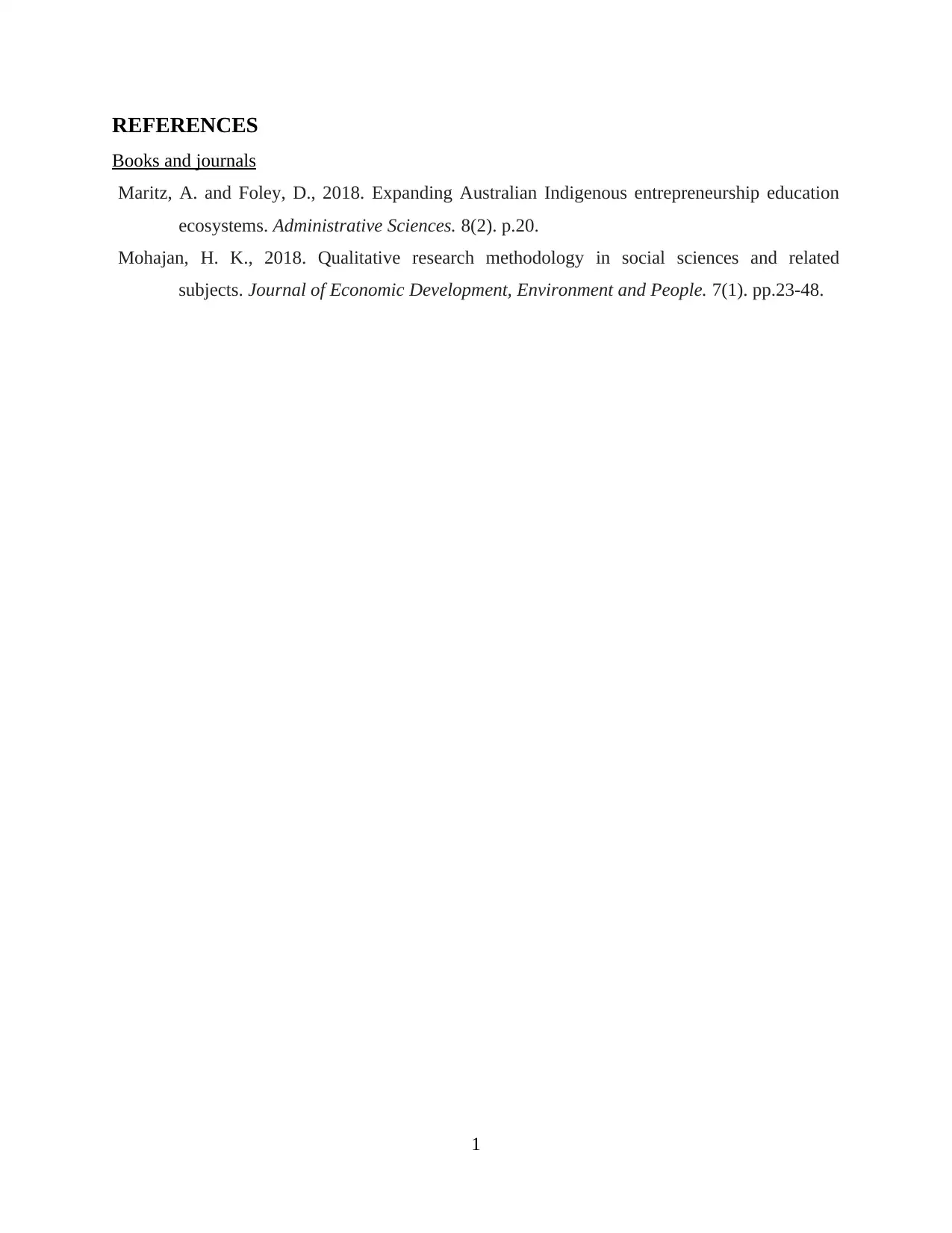
REFERENCES
Books and journals
Maritz, A. and Foley, D., 2018. Expanding Australian Indigenous entrepreneurship education
ecosystems. Administrative Sciences. 8(2). p.20.
Mohajan, H. K., 2018. Qualitative research methodology in social sciences and related
subjects. Journal of Economic Development, Environment and People. 7(1). pp.23-48.
1
Books and journals
Maritz, A. and Foley, D., 2018. Expanding Australian Indigenous entrepreneurship education
ecosystems. Administrative Sciences. 8(2). p.20.
Mohajan, H. K., 2018. Qualitative research methodology in social sciences and related
subjects. Journal of Economic Development, Environment and People. 7(1). pp.23-48.
1
⊘ This is a preview!⊘
Do you want full access?
Subscribe today to unlock all pages.

Trusted by 1+ million students worldwide
1 out of 6
Related Documents
Your All-in-One AI-Powered Toolkit for Academic Success.
+13062052269
info@desklib.com
Available 24*7 on WhatsApp / Email
![[object Object]](/_next/static/media/star-bottom.7253800d.svg)
Unlock your academic potential
Copyright © 2020–2025 A2Z Services. All Rights Reserved. Developed and managed by ZUCOL.





